初中英语牛津译林版七年级下册同步课件:Unit 8 Pets Period 3 Grammar (共51张PPT)
文档属性
| 名称 | 初中英语牛津译林版七年级下册同步课件:Unit 8 Pets Period 3 Grammar (共51张PPT) | 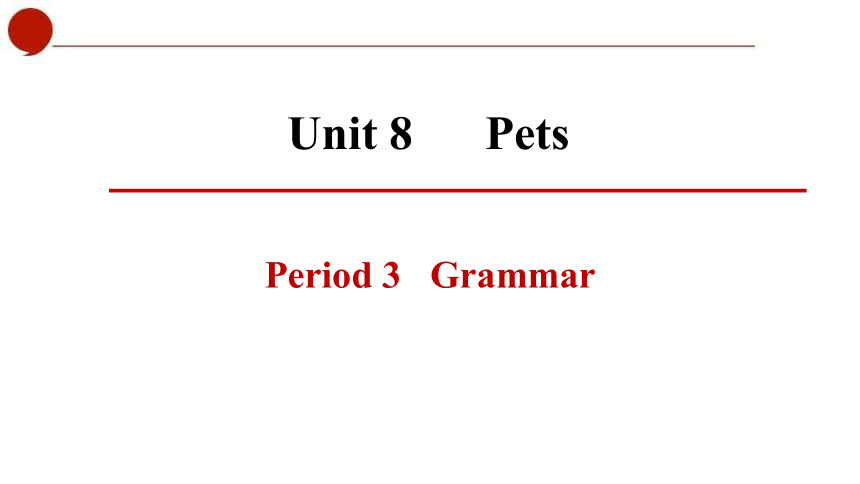 | |
| 格式 | ppt | ||
| 文件大小 | 30.6MB | ||
| 资源类型 | 教案 | ||
| 版本资源 | 牛津译林版 | ||
| 科目 | 英语 | ||
| 更新时间 | 2023-05-18 17:58:29 | ||
图片预览

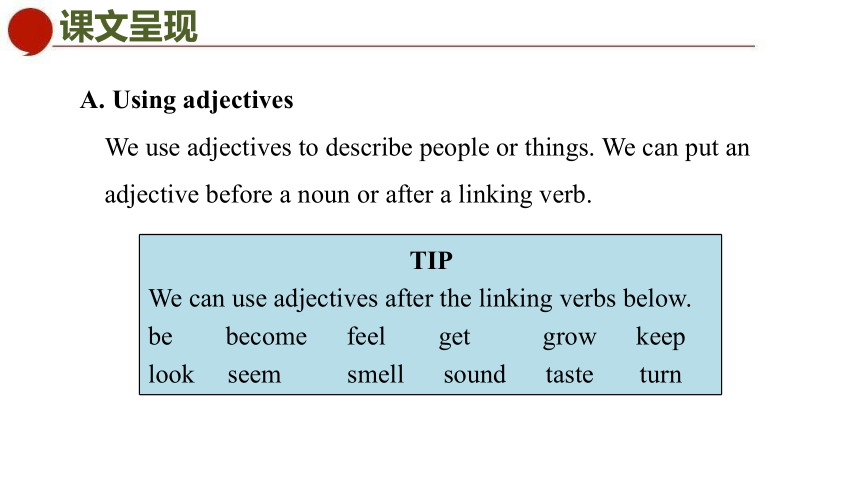
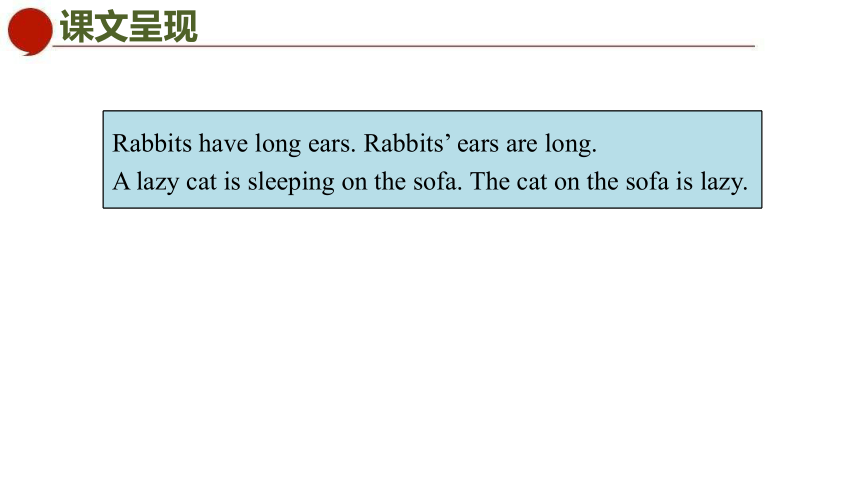
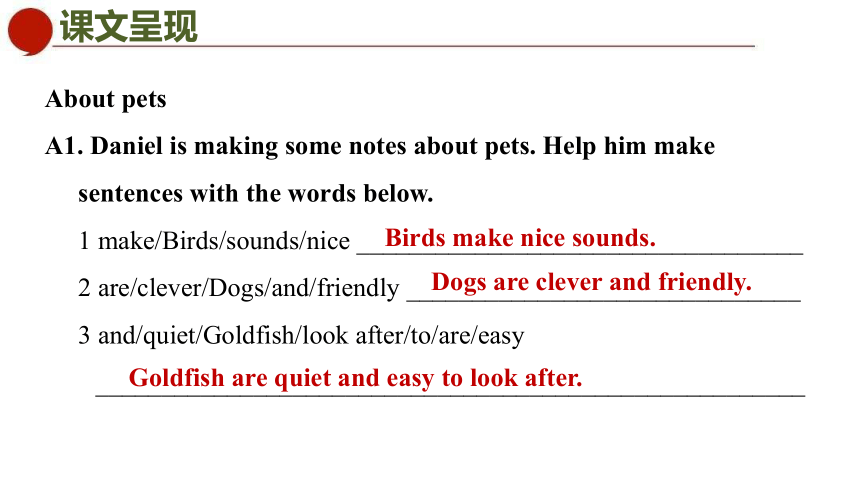
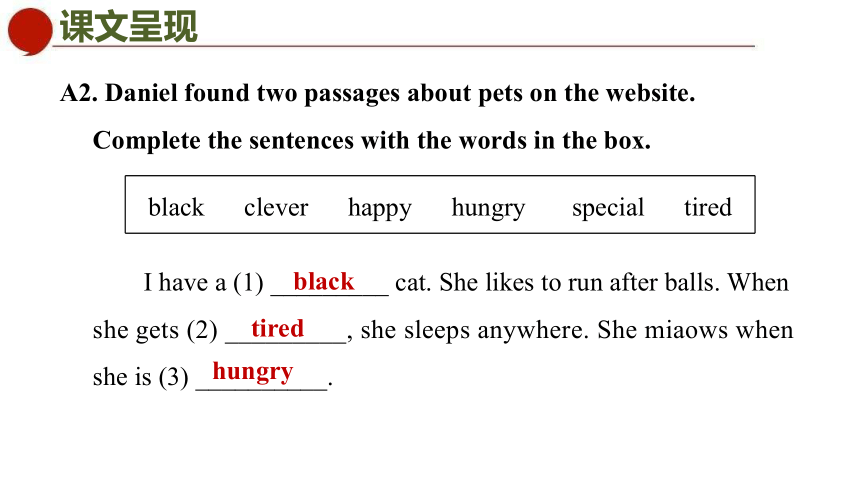
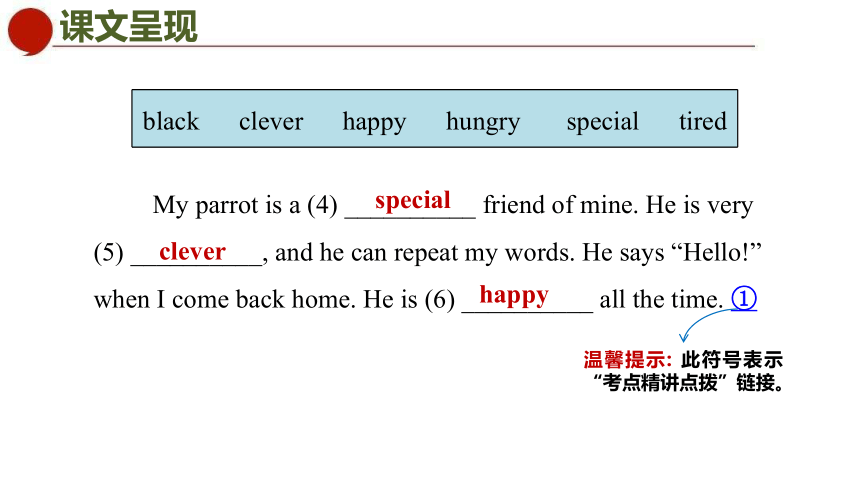
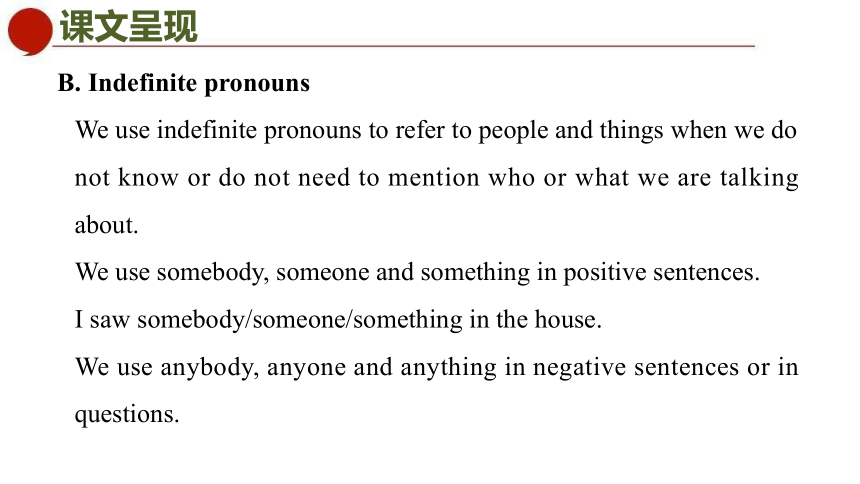



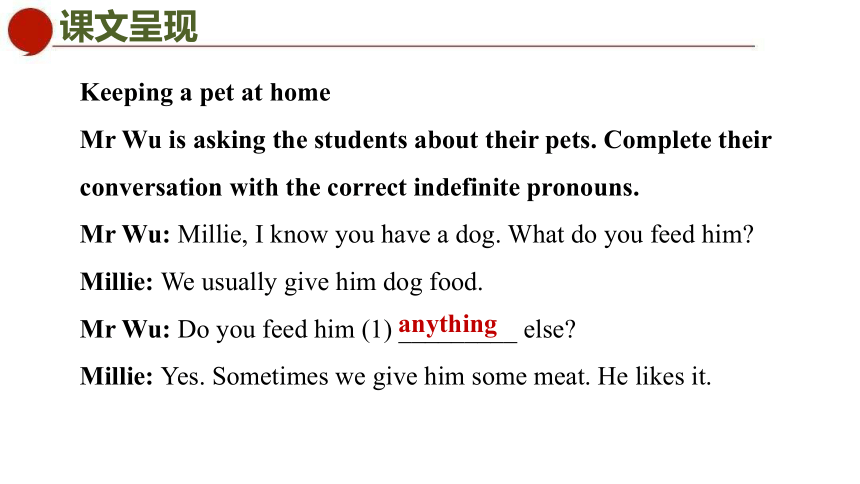
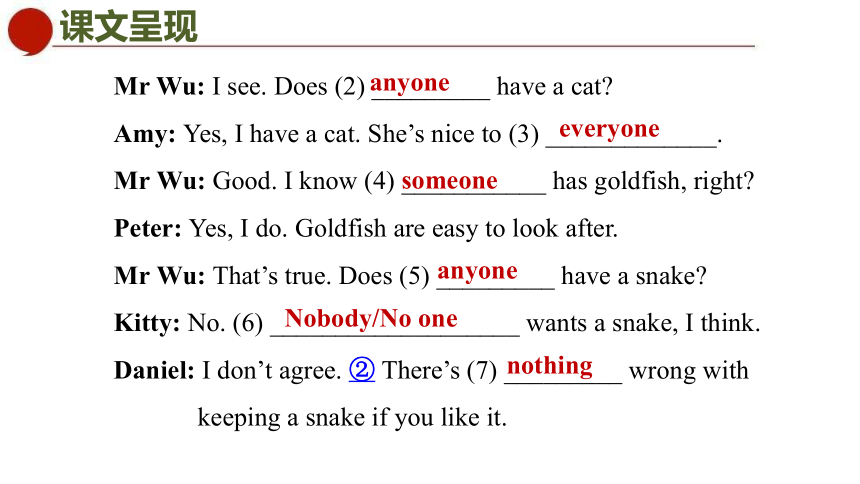
文档简介
(共51张PPT)
Period 3 Grammar
Unit 8 Pets
A. Using adjectives
We use adjectives to describe people or things. We can put an adjective before a noun or after a linking verb.
TIP
We can use adjectives after the linking verbs below.
be become feel get grow keep
look seem smell sound taste turn
Rabbits have long ears. Rabbits’ ears are long.
A lazy cat is sleeping on the sofa. The cat on the sofa is lazy.
About pets
A1. Daniel is making some notes about pets. Help him make sentences with the words below.
1 make/Birds/sounds/nice __________________________________
2 are/clever/Dogs/and/friendly ______________________________
3 and/quiet/Goldfish/look after/to/are/easy
______________________________________________________
Birds make nice sounds.
Dogs are clever and friendly.
Goldfish are quiet and easy to look after.
A2. Daniel found two passages about pets on the plete the sentences with the words in the box.
I have a (1) _________ cat. She likes to run after balls. When she gets (2) _________, she sleeps anywhere. She miaows when she is (3) __________.
black clever happy hungry special tired
black
tired
hungry
My parrot is a (4) __________ friend of mine. He is very (5) __________, and he can repeat my words. He says “Hello!” when I come back home. He is (6) __________ all the time. ①
black clever happy hungry special tired
special
clever
happy
温馨提示: 此符号表示“考点精讲点拨”链接。
B. Indefinite pronouns
We use indefinite pronouns to refer to people and things when we do not know or do not need to mention who or what we are talking about.
We use somebody, someone and something in positive sentences.
I saw somebody/someone/something in the house.
We use anybody, anyone and anything in negative sentences or in questions.
I did not see anybody/anyone/anything in the house.
Did you see anybody/anyone/anything in the house
We use nobody, no one and nothing to refer to “not anyone” and “not anything”.
There is nobody/no one/nothing in the house.
We use everybody, everyone and everything to refer to “all people” and “all things”.
Is everybody/everyone here today
Everything is ready.
TIP
When we are offering something or when we expect the answer to be “yes”, we can use something/somebody/someone in questions. something/somebody/someone。
Would you like something to eat Is someone there
TIP
I did not hear anybody. = I heard nobody.
TIP
No one is written as two words.
Keeping a pet at home
Mr Wu is asking the students about their plete their conversation with the correct indefinite pronouns.
Mr Wu: Millie, I know you have a dog. What do you feed him
Millie: We usually give him dog food.
Mr Wu: Do you feed him (1) _________ else
Millie: Yes. Sometimes we give him some meat. He likes it.
anything
Mr Wu: I see. Does (2) _________ have a cat
Amy: Yes, I have a cat. She’s nice to (3) _____________.
Mr Wu: Good. I know (4) ___________ has goldfish, right
Peter: Yes, I do. Goldfish are easy to look after.
Mr Wu: That’s true. Does (5) _________ have a snake
Kitty: No. (6) ___________________ wants a snake, I think.
Daniel: I don’t agree. ② There’s (7) _________ wrong with keeping a snake if you like it.
anyone
everyone
someone
anyone
Nobody/No one
nothing
①He is (6) ______ all the time.
all the time 一直, 总是
e.g. She wears a smile on her face all the time.
她一直面带微笑。
考点1
有关time 的常用短语:
① at that time 在那时
② at the same time 同时
③ in time 及时
④ on time 准时
⑤ from time to time 不时,有时
返回
温馨提示:可返回原文
②I don’t agree.
agree / 'ɡri / vi.&vt 同意; 应允
e.g. The head teacher agreed that we should have a meeting.
校长同意我们应该开个会。
Answer with a plain “yes” if you agree with me.
如果你同意我的意见, 就直接回答“是”。
Do you agree to have dinner today
今天你同意一块吃晚饭吗
考点2
agree+that 从句
agree with sb.
同意某人
agree to do sth. 同意做某事
中考在线1: —I think washing hands every day is good _______ our health.
—Yes, I agree ______ you. [滨州]
A. to; to B. with; to
C. for; with D. at; with
C
【点拨】本题用固定搭配法。考查固定搭配。be good to 对……好; be good with 与……相处得好; be good for 有利于; be good at 擅长; agree to + 表示计划、建议的名词, 意为同意; agree with sb. 同意某人的观点。根据第一空后的our health 可知, 此处表示有利于健康, 要用be good for; 第二空后宾语you 表示人, 表示同意你的观点, 用agree with。故选C。
中考在线2: —I think art should be about creating beautiful objects.
―_____. That’s a very old-fashioned way of looking at art.
[南京]
A. My pleasure B. It doesn’t matter
C. Take it easy D. I don’t agree
【点拨】本题用交际法。考查情景交际。句意: —我认为艺术应该是关于创造美丽的物体。—我不赞同。那是看待艺术的一种老思想。My pleasure 不客气; It doesn’t matter 没关系; Take it easy 轻松点; I don’t agree 我不赞同。根据答语“That’s a very old-fashioned way of looking at art”可知, 不同意前者的说法。故选D。
D
返回
英语中用来描述人或事物的性质、状态及特征的词叫形容词。
考点1
形容词
中考在线1: —Peter has a _______ memory and often forgets the names of people around him. [苏州]
A. long B. good C. rich D. poor
【点拨】本题用词义辨析法。考查形容词辨析。句意: 彼得记忆力差, 他经常忘记周围人的名字。long 长的; good 好的; rich 富有的, 丰富的; poor 贫穷的, 可怜的, 糟糕的。根据下文“经常忘记周围人的名字”可知“记忆力差”。用poor memory 表达。故选D。
D
形容词的功能
(1) 形容词作定语
①单个形容词作定语时, 一般放在被修饰的名词前。
e.g. She is a good girl. 她是一个好女孩儿。
考点2
② 形容词修饰不定代词时, 要放在不定代词的后面。
e.g. There is nothing important.
没有什么重要的事情。
③ “基数词- 单数可数名词- 形容词”为复合形容词, 放在被修饰词的前面。
e.g. Tom is an eight-year-old boy.
汤姆是一个八岁的男孩。
(2) 形容词作表语时, 与连系动词构成系表结构。
e.g. The meal is delicious. 这顿饭很美味。
(3) 形容词作宾语补足语时, 用来说明宾语的性质、
状态或特征。
e.g. I found the book interesting.
我发现这本书有趣。
中考在线2: What a _______ boy! He worked out such a difficult math problem. [重庆A 卷]
A. strong B. kind C. lazy D. clever
【点拨】本题用词义辨析法。考查形容词辨析。句意: 多聪明的一个男孩啊!他解出来了一道那么难的数学题。strong 强壮的; kind 善良的; lazy 懒惰的; clever 聪明的。由句意可知选D。
D
注意事项
(1) 多个形容词修饰名词的顺序限定词(冠词、指示代词、形容词性物主代词、数词) ?描绘词(大小、长短、形状、长幼、新旧、颜色、国籍、材料) ?名词
考点3
e.g. a famous American medical college
一所著名的美国医学院
a beautiful tall building
一座漂亮而高大的建筑物
中考在线3: They have got such a ______ table.
A. round wooden brown
B. round brown wooden
C. brown round wooden
【点拨】根据多个形容词修饰名词的排列顺序, 这三个形容词的排列顺序为: 形状+ 颜色+ 材料。故选B。
B
(2) 有些形容词只能作定语。如: only(唯一的) , elder(年长的) 等及复合形容词man-made(人造的) , English-speaking(说英语的) 等。
(3) 有些形容词只能作表语, 如: ill, alone, asleep, alive 等。
(4) 有些词以ly结尾貌似是副词但其实是形容词,
如: friendly, lively, lonely, lovely 等。
(5) 以-ing 结尾的形容词作表语时, 主语通常是物; 以-ed 结尾的形容词作表语时, 主语通常是人。
中考在线4: We are _______ about the _______ news that Beijing will hold the Winter Olympics in 2022. [龙东]
A. excited; exciting B. exciting; excited
C. excited; excite
【点拨】本题用词语应用法。考查形容词的用法。句意: 我们对北京将于2022 年举办冬季奥运会的令人兴奋的消息感到兴奋。excited 表示人的感受, exciting 表示物的性质。根据句意可知选A。
A
不定代词的构成
不定代词是由some-, any-, no-, every- 加上one, body, thing 等构成。不定代词没有主格和宾格之分, 在句中可作主语、宾语和表语。something, somebody, someone, everything, everybody, everyone 用于肯定句中; anything, anybody, anyone 用于疑问句或否定句中; no one, nobody, nothing 表示否定意义。
考点1
不定代词
中考在线5: —Why are you laughing, Daniel
—There is _____ funny in the e and see.
[盐城]
A. anything B. something
C. everything D. nothing
【点拨】考查不定代词的用法。句意: —你为什么开怀大笑, 丹尼尔 —报纸上这些事太好笑了。过来看看。承接上文句意, 下文肯定句中用something表示“某事; 一些事情”, 易混项everything 表示“一切”, 和句意不符。故选B。
B
不定代词的指代对象
(1) 含-body 和-one 的不定代词只用来指人, 二者可互换。
e.g. Someone/ Somebody is crying in the next room.
隔壁房间有人在哭。
(2) 含-thing 的不定代词用来指物。
e.g. Are you going to buy anything
你打算去买东西吗
考点2
中考在线6: —Who is at the door
—A delivery man(快递员) or ______ wanting to sell his new products. [泰州]
A. everybody B. anybody
C. somebody D. nobody
【点拨】本题用词语应用法。考查不定代词。句意: —谁在门口 —送货人(快递员) , 或者有人想要卖掉他的新产品。everybody 每一个人; anybody 任何人; somebody 某人, 有人; nobody 没有人。根据答语“或是某人想要卖他的新产品”可知, 故选C。
C
不定代词的定语
不定代词的定语必须后置, 即放到不定代词的后面。
e.g. There is somebody strange in the street.
街上有个奇怪的人。
考点3
中考在线7: Did you do _______ during the last summer vacation [绥化]
A. something special B. special something
C. anything special
【点拨】本题用语法判定法。考查形容词修饰不定代词的位置。形容词修饰不定代词, 形容词放在不定代词之后, something 多用于肯定句, anything 多用于否定句或疑问句中。故选C。
C
不定代词的数
不定代词都具有单数含义, 因此通常被看成是第三人称单数。当它们作主语时, 其后的谓语动词用单数形式。
e.g. Nothing is important. 没什么重要的。
I hope everything goes well.
我希望一切顺利。
考点4
不定代词的特殊用法
(1) 若是希望对方作出肯定回答的一般疑问句, 不用anything/anybody, 要用something/somebody。
e.g. Could you tell me something about the accident
你可以告诉我一些有关这个事故的事情吗
考点5
中考在线8: Would you like _______ to drink [怀化]
A. something B. anything C. nothing
【点拨】考查不定代词的用法辨析。句意: 你想要一些喝的东西吗 something 一些东西; anything 任何东西; nothing 没有东西。问句是想要得到对方的肯定回答, 所以要用something 表示“一些喝的东西”。故选A。
A
(2) 含-one 和-body 等指人的不定代词的所有格形式为其后跟“’s”, 但若不定代词之后跟else 时, “’s”应加在else 之后。
e.g. Can you remember someone else’s name
你还能记得其他人的名字吗
1. The city welcomes visitors from _____________ (任何地方) .
2. Please __________ (重复) the following sentence after me.
3. Do you __________ (同意) to have dinner today
4. My sister __________ (饲养) a dog and a cat as pets.
5. I have a dog and a cat, but they fight _____________ (一直) .
一、根据句意及汉语提示完成句子
anywhere
repeat
agree
keeps
all the time
6. Please be ______. There’s an important meeting in the next room.
A. safely B. safe C. quietly D. quiet
二、单项选择
【点拨】本题考查形容词的用法。safely副词,“安全地”;safe形容词,“安全的”;quietly副词,“安静地”;quiet形容词,“安静的”。be后跟形容词,排除A、C项;由句意“请安静。隔壁房间有一个重要的会议。”可知选D。
D
7. Mum likes making pies and the pies she cooks taste ______.
I like them.
A. good B. well C. bad D. badly
【点拨】考查系动词的用法。句意:妈妈喜欢做馅饼。她做的馅饼尝起来很好吃。我喜欢它们。good是形容词,意为“好的”;well副词,意为“好”;bad形容词,意为“坏的”;badly副词,意为“很,非常”。taste是系动词,后接形容词。故答案为A。
A
8. —You look so ______. What’s wrong
—I can’t find my mobile phone. [营口]
A. tired B. relaxed
C. excited D. worried
【点拨】考查形容词辨析。句意:你看起来那么____,你怎么啦?—我没能找到我的手机。“没找到手机”肯定让人焦虑。故选D。
D
9. What ______ news! We’ve never had such a long vacation before. [本溪]
A. missing B. boring C. worrying D. exciting
【点拨】考查形容词用法辨析。句意:多么令人激动的消息啊!我们以前从没有这么长的假期。missing失踪的;boring乏味的;worrying令人担忧的;exciting令人激动的。根据后句句意可知,空白处应用exciting表示“令人兴奋的,令人激动的”,故选D。
D
10. My little brother is a tidy boy. He always keeps his room _____.
[长春]
A. clean B. to clean C. cleaning D. cleaned
【点拨】本题用语法判定法。句意:我的小弟弟是个干净的男孩。他总是使他的房间保持清洁。keep...clean表“使……保持清洁”,其中的clean是形容词,作宾语补足语。故选A。
A
11. —Amazing! Tom got the best grade in the test last week.
—_____ is impossible. He studies really hard online this term.
[黄冈]
A. Anything B. Nothing
C. Everything D. Something
【点拨】考查不定代词的用法辨析。句意:—太不可思议了!汤姆在上周的测试中得到了最好成绩。—没有什么是不可能的。他这学期在网上学习很努力。Anything任何事物;Nothing没有什么;Everything每件事物;Something某物。根据语境可知此处要用否定表示“没有什么”。故选B。
B
12. —Wow, so cool! Who taught you to play Tik Tok(抖音)
[玉林]
—______. I learned it by ______.
A. Somebody; myself B. Nobody; myself
C. Nobody; me D. Somebody; me
【点拨】考查代词的用法。句意:—哇,太酷了!谁教你玩抖音的?—没人。我自学的。by oneself意为“某人自己”。排除C、D选项。再结合句意可知,“自学的,没人教”,Nobody符合语境。故选B。
B
13. —Have you brought ______ with you We won’t have time to come back.
—Don’t worry. All the things we need are here, in this big bag. [乐山改编]
A. everything B. something
C. anything D. nothing
【点拨】考查不定代词辨析。句意:—你把东西都带来了吗 我们没有时间回来了。—不要担心。我们需要的东西都在这里,在这个大袋子里。everything 所有事物,一切;something某物;anything任何东西,任何事物;nothing没有东西。根据句意选A。
A
14. He was too sad to say ______ when he heard the bad news.
[营口]
A. something B. anything
C. everything D. nothing
【点拨】考查不定代词的用法。句意:当他听到这个坏消息时,他悲伤得说不出话来。something某事;anything任何事情;everything每件事情;nothing没有事情。too...to...太……而不能……根据语境可知,应是听到坏消息时,他太伤心了,说不出来任何话,横线处应是anything。故选B。
B
15. Sam played games for fun when he was young, but now he wants to do ______.
A. something else B. anything else
C. else something D. else anything
【点拨】本题用语法判定法。本句为肯定句应该用something;else意为“其他的”,应该放在不定代词的后面,故选A。
A
16. There’s nobody in the classroom. (改为同义句)
There _________ _________ in the classroom.
17. Uncle Xiao didn’t say anything at the meeting. (改为同义句)
Uncle Xiao _________ ___________ at the meeting.
三、句型转换
isn’t anybody
said nothing
18. There is something wrong with your computer.
(改为否定句)
There is _________ _________ with your computer.
19. Everyone is here. (改为一般疑问句)
_________ _____________ here
20. I saw nobody in the classroom. (改为同义句)
I _______ _______ __________________ in the classroom.
nothing wrong
Is everyone
didn’t see anybody/ anyone
本节课主要学习了以下知识点, 请同学们及时巩固练习:
anywhere , repeat , agree , all the time……
Period 3 Grammar
Unit 8 Pets
A. Using adjectives
We use adjectives to describe people or things. We can put an adjective before a noun or after a linking verb.
TIP
We can use adjectives after the linking verbs below.
be become feel get grow keep
look seem smell sound taste turn
Rabbits have long ears. Rabbits’ ears are long.
A lazy cat is sleeping on the sofa. The cat on the sofa is lazy.
About pets
A1. Daniel is making some notes about pets. Help him make sentences with the words below.
1 make/Birds/sounds/nice __________________________________
2 are/clever/Dogs/and/friendly ______________________________
3 and/quiet/Goldfish/look after/to/are/easy
______________________________________________________
Birds make nice sounds.
Dogs are clever and friendly.
Goldfish are quiet and easy to look after.
A2. Daniel found two passages about pets on the plete the sentences with the words in the box.
I have a (1) _________ cat. She likes to run after balls. When she gets (2) _________, she sleeps anywhere. She miaows when she is (3) __________.
black clever happy hungry special tired
black
tired
hungry
My parrot is a (4) __________ friend of mine. He is very (5) __________, and he can repeat my words. He says “Hello!” when I come back home. He is (6) __________ all the time. ①
black clever happy hungry special tired
special
clever
happy
温馨提示: 此符号表示“考点精讲点拨”链接。
B. Indefinite pronouns
We use indefinite pronouns to refer to people and things when we do not know or do not need to mention who or what we are talking about.
We use somebody, someone and something in positive sentences.
I saw somebody/someone/something in the house.
We use anybody, anyone and anything in negative sentences or in questions.
I did not see anybody/anyone/anything in the house.
Did you see anybody/anyone/anything in the house
We use nobody, no one and nothing to refer to “not anyone” and “not anything”.
There is nobody/no one/nothing in the house.
We use everybody, everyone and everything to refer to “all people” and “all things”.
Is everybody/everyone here today
Everything is ready.
TIP
When we are offering something or when we expect the answer to be “yes”, we can use something/somebody/someone in questions. something/somebody/someone。
Would you like something to eat Is someone there
TIP
I did not hear anybody. = I heard nobody.
TIP
No one is written as two words.
Keeping a pet at home
Mr Wu is asking the students about their plete their conversation with the correct indefinite pronouns.
Mr Wu: Millie, I know you have a dog. What do you feed him
Millie: We usually give him dog food.
Mr Wu: Do you feed him (1) _________ else
Millie: Yes. Sometimes we give him some meat. He likes it.
anything
Mr Wu: I see. Does (2) _________ have a cat
Amy: Yes, I have a cat. She’s nice to (3) _____________.
Mr Wu: Good. I know (4) ___________ has goldfish, right
Peter: Yes, I do. Goldfish are easy to look after.
Mr Wu: That’s true. Does (5) _________ have a snake
Kitty: No. (6) ___________________ wants a snake, I think.
Daniel: I don’t agree. ② There’s (7) _________ wrong with keeping a snake if you like it.
anyone
everyone
someone
anyone
Nobody/No one
nothing
①He is (6) ______ all the time.
all the time 一直, 总是
e.g. She wears a smile on her face all the time.
她一直面带微笑。
考点1
有关time 的常用短语:
① at that time 在那时
② at the same time 同时
③ in time 及时
④ on time 准时
⑤ from time to time 不时,有时
返回
温馨提示:可返回原文
②I don’t agree.
agree / 'ɡri / vi.&vt 同意; 应允
e.g. The head teacher agreed that we should have a meeting.
校长同意我们应该开个会。
Answer with a plain “yes” if you agree with me.
如果你同意我的意见, 就直接回答“是”。
Do you agree to have dinner today
今天你同意一块吃晚饭吗
考点2
agree+that 从句
agree with sb.
同意某人
agree to do sth. 同意做某事
中考在线1: —I think washing hands every day is good _______ our health.
—Yes, I agree ______ you. [滨州]
A. to; to B. with; to
C. for; with D. at; with
C
【点拨】本题用固定搭配法。考查固定搭配。be good to 对……好; be good with 与……相处得好; be good for 有利于; be good at 擅长; agree to + 表示计划、建议的名词, 意为同意; agree with sb. 同意某人的观点。根据第一空后的our health 可知, 此处表示有利于健康, 要用be good for; 第二空后宾语you 表示人, 表示同意你的观点, 用agree with。故选C。
中考在线2: —I think art should be about creating beautiful objects.
―_____. That’s a very old-fashioned way of looking at art.
[南京]
A. My pleasure B. It doesn’t matter
C. Take it easy D. I don’t agree
【点拨】本题用交际法。考查情景交际。句意: —我认为艺术应该是关于创造美丽的物体。—我不赞同。那是看待艺术的一种老思想。My pleasure 不客气; It doesn’t matter 没关系; Take it easy 轻松点; I don’t agree 我不赞同。根据答语“That’s a very old-fashioned way of looking at art”可知, 不同意前者的说法。故选D。
D
返回
英语中用来描述人或事物的性质、状态及特征的词叫形容词。
考点1
形容词
中考在线1: —Peter has a _______ memory and often forgets the names of people around him. [苏州]
A. long B. good C. rich D. poor
【点拨】本题用词义辨析法。考查形容词辨析。句意: 彼得记忆力差, 他经常忘记周围人的名字。long 长的; good 好的; rich 富有的, 丰富的; poor 贫穷的, 可怜的, 糟糕的。根据下文“经常忘记周围人的名字”可知“记忆力差”。用poor memory 表达。故选D。
D
形容词的功能
(1) 形容词作定语
①单个形容词作定语时, 一般放在被修饰的名词前。
e.g. She is a good girl. 她是一个好女孩儿。
考点2
② 形容词修饰不定代词时, 要放在不定代词的后面。
e.g. There is nothing important.
没有什么重要的事情。
③ “基数词- 单数可数名词- 形容词”为复合形容词, 放在被修饰词的前面。
e.g. Tom is an eight-year-old boy.
汤姆是一个八岁的男孩。
(2) 形容词作表语时, 与连系动词构成系表结构。
e.g. The meal is delicious. 这顿饭很美味。
(3) 形容词作宾语补足语时, 用来说明宾语的性质、
状态或特征。
e.g. I found the book interesting.
我发现这本书有趣。
中考在线2: What a _______ boy! He worked out such a difficult math problem. [重庆A 卷]
A. strong B. kind C. lazy D. clever
【点拨】本题用词义辨析法。考查形容词辨析。句意: 多聪明的一个男孩啊!他解出来了一道那么难的数学题。strong 强壮的; kind 善良的; lazy 懒惰的; clever 聪明的。由句意可知选D。
D
注意事项
(1) 多个形容词修饰名词的顺序限定词(冠词、指示代词、形容词性物主代词、数词) ?描绘词(大小、长短、形状、长幼、新旧、颜色、国籍、材料) ?名词
考点3
e.g. a famous American medical college
一所著名的美国医学院
a beautiful tall building
一座漂亮而高大的建筑物
中考在线3: They have got such a ______ table.
A. round wooden brown
B. round brown wooden
C. brown round wooden
【点拨】根据多个形容词修饰名词的排列顺序, 这三个形容词的排列顺序为: 形状+ 颜色+ 材料。故选B。
B
(2) 有些形容词只能作定语。如: only(唯一的) , elder(年长的) 等及复合形容词man-made(人造的) , English-speaking(说英语的) 等。
(3) 有些形容词只能作表语, 如: ill, alone, asleep, alive 等。
(4) 有些词以ly结尾貌似是副词但其实是形容词,
如: friendly, lively, lonely, lovely 等。
(5) 以-ing 结尾的形容词作表语时, 主语通常是物; 以-ed 结尾的形容词作表语时, 主语通常是人。
中考在线4: We are _______ about the _______ news that Beijing will hold the Winter Olympics in 2022. [龙东]
A. excited; exciting B. exciting; excited
C. excited; excite
【点拨】本题用词语应用法。考查形容词的用法。句意: 我们对北京将于2022 年举办冬季奥运会的令人兴奋的消息感到兴奋。excited 表示人的感受, exciting 表示物的性质。根据句意可知选A。
A
不定代词的构成
不定代词是由some-, any-, no-, every- 加上one, body, thing 等构成。不定代词没有主格和宾格之分, 在句中可作主语、宾语和表语。something, somebody, someone, everything, everybody, everyone 用于肯定句中; anything, anybody, anyone 用于疑问句或否定句中; no one, nobody, nothing 表示否定意义。
考点1
不定代词
中考在线5: —Why are you laughing, Daniel
—There is _____ funny in the e and see.
[盐城]
A. anything B. something
C. everything D. nothing
【点拨】考查不定代词的用法。句意: —你为什么开怀大笑, 丹尼尔 —报纸上这些事太好笑了。过来看看。承接上文句意, 下文肯定句中用something表示“某事; 一些事情”, 易混项everything 表示“一切”, 和句意不符。故选B。
B
不定代词的指代对象
(1) 含-body 和-one 的不定代词只用来指人, 二者可互换。
e.g. Someone/ Somebody is crying in the next room.
隔壁房间有人在哭。
(2) 含-thing 的不定代词用来指物。
e.g. Are you going to buy anything
你打算去买东西吗
考点2
中考在线6: —Who is at the door
—A delivery man(快递员) or ______ wanting to sell his new products. [泰州]
A. everybody B. anybody
C. somebody D. nobody
【点拨】本题用词语应用法。考查不定代词。句意: —谁在门口 —送货人(快递员) , 或者有人想要卖掉他的新产品。everybody 每一个人; anybody 任何人; somebody 某人, 有人; nobody 没有人。根据答语“或是某人想要卖他的新产品”可知, 故选C。
C
不定代词的定语
不定代词的定语必须后置, 即放到不定代词的后面。
e.g. There is somebody strange in the street.
街上有个奇怪的人。
考点3
中考在线7: Did you do _______ during the last summer vacation [绥化]
A. something special B. special something
C. anything special
【点拨】本题用语法判定法。考查形容词修饰不定代词的位置。形容词修饰不定代词, 形容词放在不定代词之后, something 多用于肯定句, anything 多用于否定句或疑问句中。故选C。
C
不定代词的数
不定代词都具有单数含义, 因此通常被看成是第三人称单数。当它们作主语时, 其后的谓语动词用单数形式。
e.g. Nothing is important. 没什么重要的。
I hope everything goes well.
我希望一切顺利。
考点4
不定代词的特殊用法
(1) 若是希望对方作出肯定回答的一般疑问句, 不用anything/anybody, 要用something/somebody。
e.g. Could you tell me something about the accident
你可以告诉我一些有关这个事故的事情吗
考点5
中考在线8: Would you like _______ to drink [怀化]
A. something B. anything C. nothing
【点拨】考查不定代词的用法辨析。句意: 你想要一些喝的东西吗 something 一些东西; anything 任何东西; nothing 没有东西。问句是想要得到对方的肯定回答, 所以要用something 表示“一些喝的东西”。故选A。
A
(2) 含-one 和-body 等指人的不定代词的所有格形式为其后跟“’s”, 但若不定代词之后跟else 时, “’s”应加在else 之后。
e.g. Can you remember someone else’s name
你还能记得其他人的名字吗
1. The city welcomes visitors from _____________ (任何地方) .
2. Please __________ (重复) the following sentence after me.
3. Do you __________ (同意) to have dinner today
4. My sister __________ (饲养) a dog and a cat as pets.
5. I have a dog and a cat, but they fight _____________ (一直) .
一、根据句意及汉语提示完成句子
anywhere
repeat
agree
keeps
all the time
6. Please be ______. There’s an important meeting in the next room.
A. safely B. safe C. quietly D. quiet
二、单项选择
【点拨】本题考查形容词的用法。safely副词,“安全地”;safe形容词,“安全的”;quietly副词,“安静地”;quiet形容词,“安静的”。be后跟形容词,排除A、C项;由句意“请安静。隔壁房间有一个重要的会议。”可知选D。
D
7. Mum likes making pies and the pies she cooks taste ______.
I like them.
A. good B. well C. bad D. badly
【点拨】考查系动词的用法。句意:妈妈喜欢做馅饼。她做的馅饼尝起来很好吃。我喜欢它们。good是形容词,意为“好的”;well副词,意为“好”;bad形容词,意为“坏的”;badly副词,意为“很,非常”。taste是系动词,后接形容词。故答案为A。
A
8. —You look so ______. What’s wrong
—I can’t find my mobile phone. [营口]
A. tired B. relaxed
C. excited D. worried
【点拨】考查形容词辨析。句意:你看起来那么____,你怎么啦?—我没能找到我的手机。“没找到手机”肯定让人焦虑。故选D。
D
9. What ______ news! We’ve never had such a long vacation before. [本溪]
A. missing B. boring C. worrying D. exciting
【点拨】考查形容词用法辨析。句意:多么令人激动的消息啊!我们以前从没有这么长的假期。missing失踪的;boring乏味的;worrying令人担忧的;exciting令人激动的。根据后句句意可知,空白处应用exciting表示“令人兴奋的,令人激动的”,故选D。
D
10. My little brother is a tidy boy. He always keeps his room _____.
[长春]
A. clean B. to clean C. cleaning D. cleaned
【点拨】本题用语法判定法。句意:我的小弟弟是个干净的男孩。他总是使他的房间保持清洁。keep...clean表“使……保持清洁”,其中的clean是形容词,作宾语补足语。故选A。
A
11. —Amazing! Tom got the best grade in the test last week.
—_____ is impossible. He studies really hard online this term.
[黄冈]
A. Anything B. Nothing
C. Everything D. Something
【点拨】考查不定代词的用法辨析。句意:—太不可思议了!汤姆在上周的测试中得到了最好成绩。—没有什么是不可能的。他这学期在网上学习很努力。Anything任何事物;Nothing没有什么;Everything每件事物;Something某物。根据语境可知此处要用否定表示“没有什么”。故选B。
B
12. —Wow, so cool! Who taught you to play Tik Tok(抖音)
[玉林]
—______. I learned it by ______.
A. Somebody; myself B. Nobody; myself
C. Nobody; me D. Somebody; me
【点拨】考查代词的用法。句意:—哇,太酷了!谁教你玩抖音的?—没人。我自学的。by oneself意为“某人自己”。排除C、D选项。再结合句意可知,“自学的,没人教”,Nobody符合语境。故选B。
B
13. —Have you brought ______ with you We won’t have time to come back.
—Don’t worry. All the things we need are here, in this big bag. [乐山改编]
A. everything B. something
C. anything D. nothing
【点拨】考查不定代词辨析。句意:—你把东西都带来了吗 我们没有时间回来了。—不要担心。我们需要的东西都在这里,在这个大袋子里。everything 所有事物,一切;something某物;anything任何东西,任何事物;nothing没有东西。根据句意选A。
A
14. He was too sad to say ______ when he heard the bad news.
[营口]
A. something B. anything
C. everything D. nothing
【点拨】考查不定代词的用法。句意:当他听到这个坏消息时,他悲伤得说不出话来。something某事;anything任何事情;everything每件事情;nothing没有事情。too...to...太……而不能……根据语境可知,应是听到坏消息时,他太伤心了,说不出来任何话,横线处应是anything。故选B。
B
15. Sam played games for fun when he was young, but now he wants to do ______.
A. something else B. anything else
C. else something D. else anything
【点拨】本题用语法判定法。本句为肯定句应该用something;else意为“其他的”,应该放在不定代词的后面,故选A。
A
16. There’s nobody in the classroom. (改为同义句)
There _________ _________ in the classroom.
17. Uncle Xiao didn’t say anything at the meeting. (改为同义句)
Uncle Xiao _________ ___________ at the meeting.
三、句型转换
isn’t anybody
said nothing
18. There is something wrong with your computer.
(改为否定句)
There is _________ _________ with your computer.
19. Everyone is here. (改为一般疑问句)
_________ _____________ here
20. I saw nobody in the classroom. (改为同义句)
I _______ _______ __________________ in the classroom.
nothing wrong
Is everyone
didn’t see anybody/ anyone
本节课主要学习了以下知识点, 请同学们及时巩固练习:
anywhere , repeat , agree , all the time……
